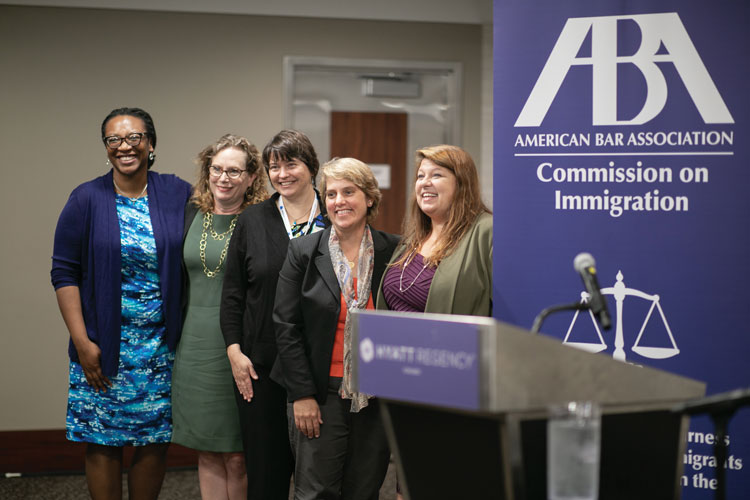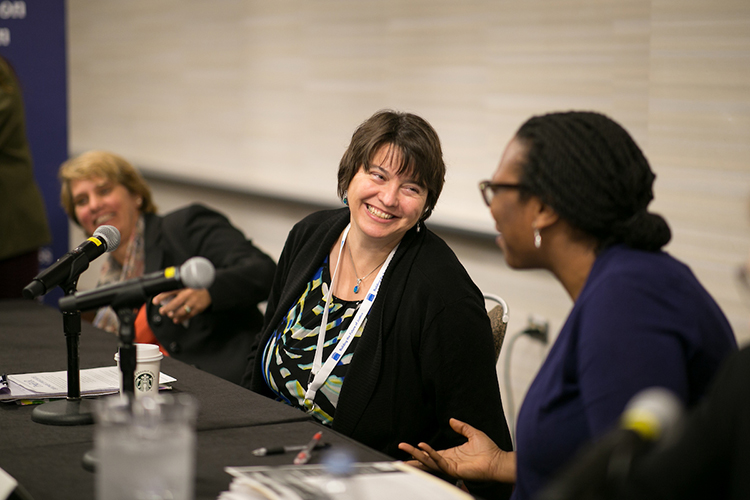Immigration lawyers must deal with ‘manufactured crisis’

Uzoamaka Emeka Nzelibe, Maria Woltjen, Kimi Jackson, Anne Chandler and Angela C. Vigil at the ABA Annual Meeting's panel "Families on the Precipice: Navigating the Separation, Detention, and Reunification of Families at the U.S. Border."
Attorneys who’ve spent their careers concentrating on immigration law and child welfare have been scrambling to deal with the fallout of the Trump administration’s immigration crackdown.
Attorney General Jeff Sessions’ April announcement of a zero-tolerance policy for unauthorized border crossings and the family separations that followed seized public attention in the spring. But some immigration attorneys and child advocates noticed the effect of these policies much earlier.
“We started seeing these cases in September of 2017—the government was separating children in different parts of the border,” said Maria Woltjen, founder and executive director of the Young Center for Immigrant Children’s Rights at the University of Chicago Law School.
But Sessions’ April directive to U.S. attorney’s offices caught many other government agencies and nonprofits off guard.
“When zero tolerance was announced, this was actually new news for the individuals running the Office of Refugee Resettlement and the deportation officers, and policies and details were not in place,” said Anne Chandler, executive director of the Tahirih Justice Center’s Houston office. “This was orchestrated to be a manufactured crisis.”
Chandler and Woltjen spoke as part of the ABA Annual Meeting panel “Families on the Precipice: Navigating the Separation, Detention, and Reunification of Families at the U.S. Border,” sponsored by the Commission on Immigration.

Kimi Jackson, director of the ABA-sponsored South Texas Pro Bono Asylum Representation Project, speaks with fellow panelist Uzoamaka Emeka Nzelibe, a Northwestern University law professor. Photo by Kathy Anderson.
FIRST RESPONDERS
For Kimi Jackson, director of ProBAR—the ABA-sponsored South Texas Pro Bono Asylum Representation Project in Harlingen, Texas—the first inkling that the government’s immigration policies had changed came when her staff members went to conduct their usual screenings, referrals and “know your rights” presentations. ProBAR traditionally serves adults and unaccompanied minors, but staffers were suddenly encountering large numbers of children separated from their families.
“We are very used to working with children who’ve experienced trauma in the past, but these kids were—they may have experienced trauma in the past, they may have experienced trauma during their journey, but they’d just experienced a severe trauma that was perpetrated by the government against them when they were separated from their parent,” Jackson said.
“As a director, I had to do a lot of things to give our staff the tools to work with this different population that was experiencing a trauma unlike anything we’d ever seen before.”
In the immediate aftermath, the need was very specific: immigration attorneys with Spanish-language skills, Jackson said. But now a much broader range of volunteers are needed and being welcomed. ProBAR is also using an influx of donations and funds to add permanent staff positions, including for attorneys. Then-ABA President Hilarie Bass shared some of what she witnessed during a trip to Texas she made in June to meet with ProBAR and visit the Port Isabel detention center. Bass urged attorneys wanting to do pro bono work on behalf of immigrant children to go to ambar.org/immigrantchild to find out ways to assist.
Fluency in a foreign language is not required for attorneys to be helpful. “We’ll take you with your linguistic skills,” Chandler said. “We have a lot of interpreters who want cases. The reality is that, as has been described, this zero tolerance is ongoing.”
Later during the ABA House of Delegates meeting, the House overwhelmingly voted in favor of Resolution 119, adopting standards on the care and treatment of unaccompanied immigrant minors, and Resolution 10C, calling on Congress and the executive branch to end the separation of immigrant families and protect their legal claims. Speaking on behalf of Resolution 10C, former ABA President Michael Greco of Boston recalled coming through Ellis Island from Italy with his family in 1950, when he was 7.
“It has occurred to me in the last few months, especially in the last few weeks, that I might not have been here 13 years ago, taking the oath as president of the ABA,” said Greco, a retired partner from K&L Gates. “We were fortunate. What is happening n this country right now, it is an abomination.”



